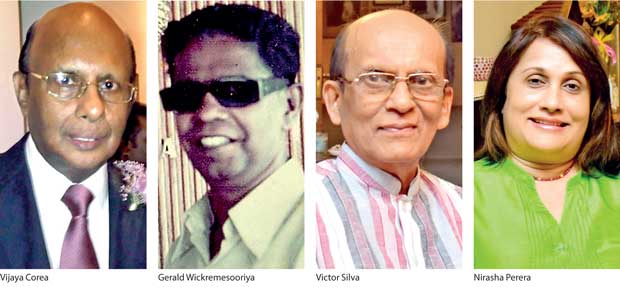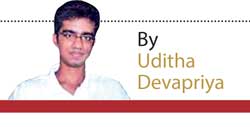Reply To:
Name - Reply Comment
Last Updated : 2024-04-19 05:34:00
PART I

 There are songs that remain etched in our minds long after we listen to them and long, long after we forget the first time we came across them. They bring to mind certain experiences that we like to forget but for some inscrutable reason don’t want to forget. Like schooldays. First crushes. Unfulfilled romances. Friendships that sour into enmities. And so on. Either way, for better or worse, the words we hum and the tunes we strum stay with us for the simple reason that such songs, the best of them at least, were meant to be retained in the repository of our collective imagination. In other words, they were initially conceived to be as unprofessional and simple as possible. They lend flavour to experience and help us associate a particular memory, bitter or jovial, with a certain time and place.
There are songs that remain etched in our minds long after we listen to them and long, long after we forget the first time we came across them. They bring to mind certain experiences that we like to forget but for some inscrutable reason don’t want to forget. Like schooldays. First crushes. Unfulfilled romances. Friendships that sour into enmities. And so on. Either way, for better or worse, the words we hum and the tunes we strum stay with us for the simple reason that such songs, the best of them at least, were meant to be retained in the repository of our collective imagination. In other words, they were initially conceived to be as unprofessional and simple as possible. They lend flavour to experience and help us associate a particular memory, bitter or jovial, with a certain time and place.
Just as there are stories behind the first times we hear such tunes, however, there are also stories behind the how, when, and wherefore of those tunes, those who ideated and came up with the melody, those who wrote down the lyrics, and those who lent their voices. Out of 100-odd songs, I’m willing to wager that not even 30 can boast of such worthy prefaces. But those 30 sadly tend to be overlooked, because we aren’t really bothered about their foreword. Who’d have thought, for instance, that Ajantha Ranasinghe wrote “Tharu Arundathi” after coming across a girl down the street whom he never dared to introduce himself to?
This is the story of one such song. Before I get to it, though, I need to get to the names of those involved in it. Two names. Victor Silva and Nirasha Perera.
Few would know of Victor and Nirasha and fewer would know that they were the two vocalists behind the song they ended up singing, right before it was appropriated, unjustly I should think, by other more established vocalists
Few would know of Victor and Nirasha and fewer would know that they were the two vocalists behind the song they ended up singing, right before it was appropriated, unjustly I should think, by other more established vocalists. Indeed, outside their immediate circle not many would believe that they were destined to become professionals in the field, right before the professions they’d carved for themselves through their education got them out of that field.
Let’s start with Victor. Victor had a passion for singing. From an early age. But there was a problem. His father didn’t want him to sing. He wanted him to become a Chartered Accountant, back then (as of now) a lucrative career. So during his early schoolboy days at Holy Cross College, Kalutara (his hometown), he didn’t pursue music despite the fact that he could perform quite well. Things changed, however, when he shifted to St Aloysius’ College in Galle and became a boarder. The priest in charge of the boarders was Father Debura, straight from Italy. He was also in charge of the Choir. Naturally, the Father tried the boarders out with their voices. Having heard Victor, he selected him then and there.
Victor obviously had a problem with his father and this he confided to the Reverend Father. The Reverend Father, thankfully, understood him well. “Don’t worry, tell him to see me,” he confidently told the young man, and the next time the parents of the boarders came to meet the priests and the rectors who ran the school, Victor readily took his mother and father to meet Father Debura. The Father had only one question to ask: “Mr Silva, would you like your son to use his voice to sing the praises of God?” The question, craftily crafted, won Victor’s father over: “No Father. Let him sing!” Remembering this conversation decades later, for me, Victor had one thing to say: “By the grace of God, and also Father Debura, I didn’t let my voice waste away!” Subsequently, he was taken in.
In 1965, St Aloysius’ took in Anton Weerasinghe, a layman practising and learning to become a priest (what one called a Scholast). Weerasinghe was versatile, with an ability to play the tabla and guitar and also to compose. Victor, who took part in various dramas and sang for them as well, soon came under his tutelage, when Weerasinghe got him and a friend of his, Eric Gunaratne, to come up with an original song. Having hankered after a tune and a set of lyrics to fit that tune, the boys finally hit upon an original they could be happy with: “Suran Menika”. Weerasinghe heard it, smiled, and polished it in his own special way.
Time passed by rather quickly. Victor left school and moved to Colombo in 1967, having passed his exams well enough to contemplate on his higher education: as usual, in accountancy. Just as it was as looked up to as it is today, however, it was as tough as it is today, so he had to stay at a hostel to get his mind on his education. The hostel he stayed at, situated near Ananda Rajakaruna Mawatha in Borella (back then called Campbell Place), housed several students engaged in various subjects, from medicine to law to engineering to accountancy. Given that they were all boys, they indulged in the usual “bajaw” session with the guitar (which Victor had by then mastered, to a certain extent). Among those friends he encountered, there was Duleep de Silva, member of the then phenomenally popular Los Flamencos (remember “Bolanda Katha” and “Kalu Kelle”?) and like Victor an article clerk at a company. “What happened was this: one fine day, Duleep asked me to come up with a song. He wanted to have it recorded.”
Neither Duleep nor Victor could versify. But they had another friend, a medical student called Nihal de Silva. Whenever Victor strummed a tune, he would rush to Nihal and the two of them would brainstorm a set of lyrics to suit that tune. So having brainstormed over and over again with respect to the tune that came up at Duleep’s request, the two of them hit on an original. They titled it “Bale Bale”, a mock, tongue-in-cheek reference to the bales of used cloth material that were imported during the Sirimavo Bandaranaike regime (owing to the fact that imports were restricted on all fronts). To crown what they done, they then came up with two more songs: “Pasal Kaale”, a ditty on the evolution of schoolboys from students to lovers, and “Suneetha”, composed by Anton Weerasinghe, by now domiciled in Manila. Having heard all three with “Suran Menika”, Duleepa took Victor and Nihal to meet Gerald Wickremesooriya.
Several stints at the SLBC English Commercial Service aboard the Sooriya Show (hosted by Vijaya Corea, who introduced him as a “rising star”) later, Victor found himself returning to the career he’d left behind, in Accountancy, when (“by the grace of God”) he managed to pass his exams quite well
Gerald, who had started the Sooriya label, was thrilled. He got them to come to his residence, in Colpetty. Having gotten hold of another popular performer, Chandima de Alwis (band member of The Spitfires, a beat group), apparently now domiciled in Australia, they all went and met Gerald and ultimately persuaded him to record all four songs. The recording, Victor remembers, was done by Patrick Denipitiya, an Old Boy of St Aloysius’, and was completed by the end of 1970. The following year, at the height of the insurrection, the four of them would record four more songs at the Dalugama Studios, polishing up the recording from 6 pm to 6 am. “Back then, if you got one tune or word wrong, you had no option but to start from scratch all over again!” Victor tells me.
Several stints at the SLBC English Commercial Service aboard the Sooriya Show (hosted by Vijaya Corea, who introduced him as a “rising star”) later, Victor found himself returning to the career he’d left behind, in Accountancy, when (“by the grace of God”) he managed to pass his exams quite well. “My father was extremely happy. I had proved to him that I could sing and balance the books.” By 1972, he was working comfortably (“to my heart’s content”) at the Ceylon Tobacco Company. But before he abandoned singing, at least for a short while, he’d meet one person who’d figure in his life a few years later: Nimal Mendis.
This is where Nirasha comes in. Victor married Nirasha’s mother’s younger sister in 1973. When the two of them would meet at family parties, they’d almost always be selected to perform middle class “baila” and pop tunes like “Koheda Yanne Rukmani?”, which was first performed and popularised at Nirasha’s school (Holy Family Convent, Bambalapitiya) and was a rehashed version of the nursery rhyme “Where Are You Going My Pretty Maid?” Uncle and niece would meet each other for a more serious song, however, when in 1978 Nimal Mendis, composing the music for Sumitra Peries’s film Ganga Addara, requested him to perform a theme song. There was a catch though: he had to perform it with a small girl. “Obviously, Nirasha fitted the bill!” Victor heartily chortles.
To be continued...

Add comment
Comments will be edited (grammar, spelling and slang) and authorized at the discretion of Daily Mirror online. The website also has the right not to publish selected comments.
Reply To:
Name - Reply Comment
On March 26, a couple arriving from Thailand was arrested with 88 live animal
According to villagers from Naula-Moragolla out of 105 families 80 can afford
Is the situation in Sri Lanka so grim that locals harbour hope that they coul
A recent post on social media revealed that three purple-faced langurs near t